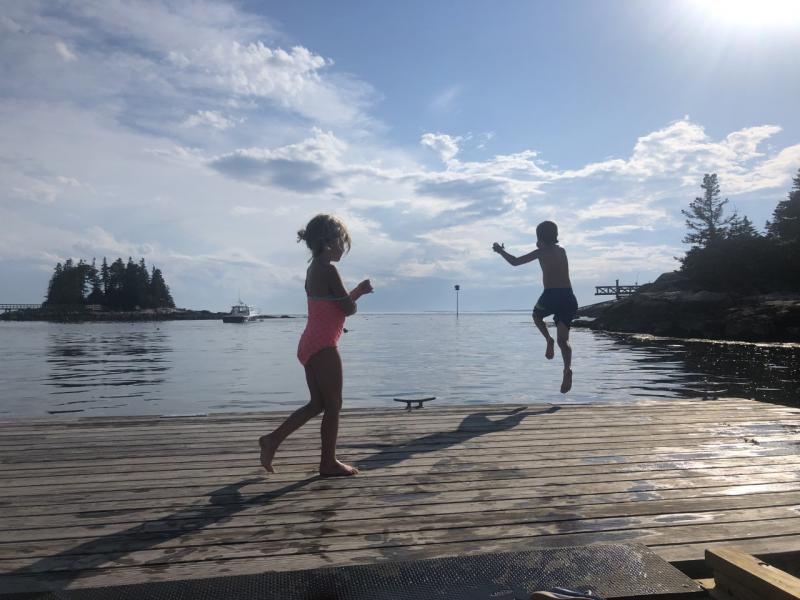During an unthinkable summer, Maine provided comfort
There’s a tradition we have when we come to Maine — not a terribly original one — of jumping off the dock near my family’s summer place. Plunging ourselves into the often icy water below, and emerging to spout untruths, hoping to coax friends into the water, too. “It’s cold at first,” we say, “but then it feels great.” Or, “It’s refreshing!” We lie because it’s more fun than the facts. Except for those rare days when the ocean temperature is above average, the water is cold and stays cold until you’re numb. And “refreshing” is another word for painful.
I’ve been coming to Maine since I was a kid and my parents decided it was the perfect getaway from swampy summers in the D.C. area, where my brother and I grew up. Our connection to the state is rooted in a love of rock climbing along the rugged shore and shell-strewn tables at favorite lobster docks; of statuesque firs and sweatshirt weather while the rest of the country melts.
We’re “from away,” a label, as I understand it, we can’t escape. The true Mainers know it, and we respect the deal.
It’s not something I ruminate on much, although I did think about our “away” status more than usual when we decided to spend a solid month up on Southport as part of this pandemic summer. I wanted a break from our home in Connecticut, which — though I adore it — has become a school and a workplace and a 24/7 hangout. We can’t escape our “away” label, maybe, but I wanted to escape to Maine more than ever, especially before the new uncertainty that the fall and winter version of this virus might bring.
So, after getting a coronavirus test (negative) and packing a variety of masks along with our shorts and T-shirts, we arrived, and began our Maine sojourn as we often do, marveling at the sunset off the coast and gathering safely with family and like-minded summer companions.
The rules were, of course, a little different. There weren’t any schedules to speak of, and, when socializing, we’d stay outside, which meant our children and their small cohort of buddies experienced something modern parents often say they want, but aren’t sure how to facilitate: independence and, perhaps more importantly, the joy of total boredom (I’m ashamed to admit that this “innovative” approach required nothing beyond having no access to camp).
This Maine trip felt more thoughtful, too. The state was, as always, both a second home and gracious host. Two worlds intertwined, which seemed a symbol of this strange and significant summer.
In carefree moments, we forgot all the problems. Then we’d recall the actual state of affairs in this country — the tragedy and politics and uprising that have marked this unthinkable year — and talk endlessly. After all, there weren't many events to interrupt the conversation.
We engaged in the very human act of wondering ... about what we might learn from all this, and how lucky we are to be in a position to think about learning anything at all.
Friendships deepened. The unplanned days passed quickly. Soon it was time to pack up our things.
We found needed peace and kinship on the shoreline this year. We found new ways to make it work, and comfort in the familiar.
Which brings me back to the dock.
I’ve been thinking about it a lot, lately, this irresistible pull to a seemingly pointless activity. An activity that, still at 42 years old, I feel dared to complete on a near-daily basis. Something I have to do, even though I don’t.
I’ve been thinking, mostly, about the most notable moment of the ritual for me: the split second when my feet have left the solid wood of the bobbing dock and I’m in the air, bracing for impact. Will it be cold enough to take my breath away? Or will the ocean surprise me by being, well, never warm, but not heart-attack inducing either.
Maybe I’m over analyzing, but perhaps it’s that moment we are all after when we jump. The uncertainty.
Because it’s exciting, sure, but also to convince ourselves we can survive it. More important this summer than others, as we navigate an endless uncertainty, ask complicated questions about how best to protect one another and wonder if we are doing this thing right. As we ask what’s next, and have to settle for a less than ideal, “We simply don’t know.”
We jump, and in that space — between solid and wavering, sanity and passion, home and away — we simply don’t know.
Then we emerge, sputtering nonsense and smiling because it wasn’t that bad, or it was, but there’s no looking back now. We don’t know, and we do it anyway. Then we return the next day, and we do it again.
Cara McDonough is a freelance writer who lives in Hamden, Connecticut with her husband, three children and dog. You can read more of her work at caramcduna.com
Event Date
Address
United States
























